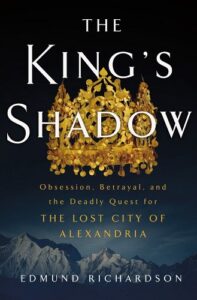The CrimeReads editors select the month’s best nonfiction crime books.
*

Mark Arsenault, The Imposter’s War: The Press, Propaganda, and the Newsman Who Battled for the Minds of America
(Pegasus)
A lively, engaging history of the lead-up to WWI and German efforts to infiltrate and influence the American media, hoping to discourage the country from throwing in its lot with Britain and France. Arsenault zeroes in on the era’s complex games of espionage and propaganda, focusing on one newsman in particular, John Rathom of The Providence Journal, who became a crusader exposing German plots, but who had a secret history and secret sources of his own.

M. Chris Fabricant, Junk Science and the American Criminal Justice System
(Akashic Books)
A searing indictment of the role junk science and so-called experts have played in both the American cultural imagination and the criminal justice system, yielding a drastically misinformed juror pool and a system utterly reliant on discredited methods to prop up its biased outcomes. Fabricant, an Innocence Project litigator, drills down to a case level to show just how broken the legal system has become, and offers some valuable insights on how we might yet fix it.

Paul Fischer, The Man Who Invented Motion Pictures: A True Story of Obsession, Murder, and the Movies
(Simon & Schuster)
I’m very excited for Paul Fischer’s gripping new book, which tells the forgotten history of Louis Le Prince, who vanished forever after developing a device that could project moving images—an invention that was demonstrated publicly three years after his disappearance by the shady professional Thomas Edison, who claimed to have invented the machine himself. It’s a clear-eyed history of the cutthroat technological world of the late nineteenth century that seeks to give credit back to a man who had everything taken from him. –Olivia Rutigliano, CrimeReads Associate Editor

Joan DeJean, Mutinous Women: How French Convicts Became Founding Mothers of the Gulf Coast
(Basic Books)
In 1719, the aptly named ship La Mutine sailed to France’s colonial holdings in the New World, carrying with it 132 women, less than half of whom would survive. The women were convicts, prosecuted under trumped-up charges of sex crimes and told they were being sent into exile. In DeJean’s eye-opening new history, she shows how the women went from these persecuted beginnings onto new lives, forming new power structures in the Louisiana territory and beyond, settling territories, and helping to establish dynasties.

Edmund Richardson, The King’s Shadow: Obsession, Betrayal, and the Deadly Quest for the Lost City of Alexandria
(St. Martin’s Press)
Richardson skillfully unfolds the beguiling tale of Charles Masson, a 19th century British East India Company deserter who went on to many different names and identities, foremost among them as an explorer, whose obsession with Alexander the Great eventually, after a great many travels, brought him to Alexandria Beneath the Mountains, a lost city found beyond the plains of Afghanistan. Masson participated in all the era’s great adventures: espionage, exploration, scholarship, storytelling, a little doctoring—always with a boldness that carried him forward to the next stop on the journey. The King’s Shadow is a fascinating study of a largely forgotten moment in the annals of exploration.

















